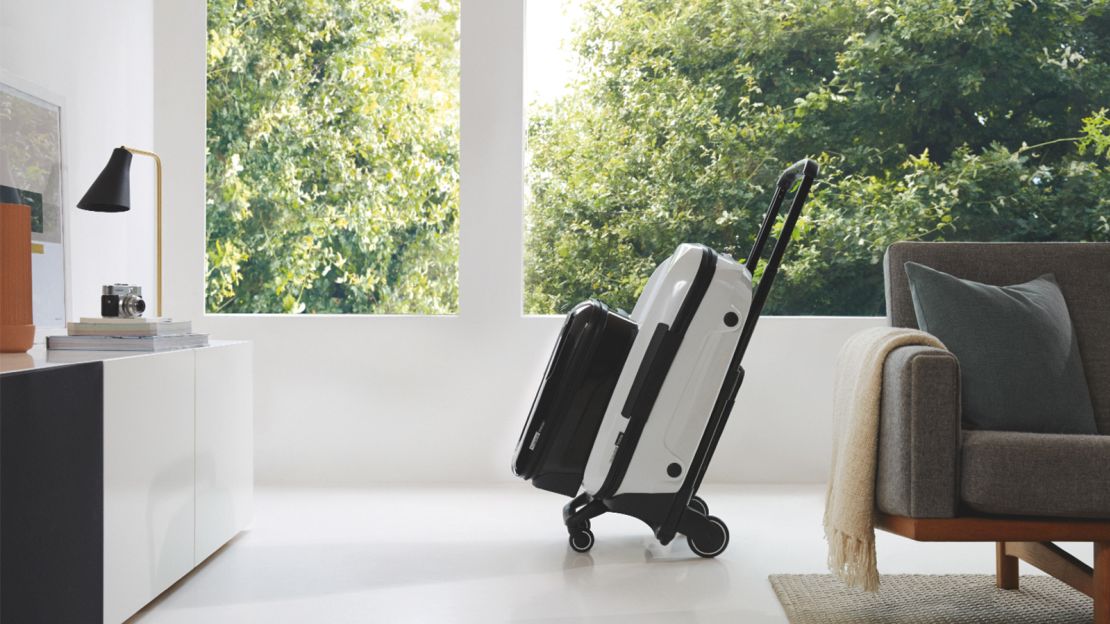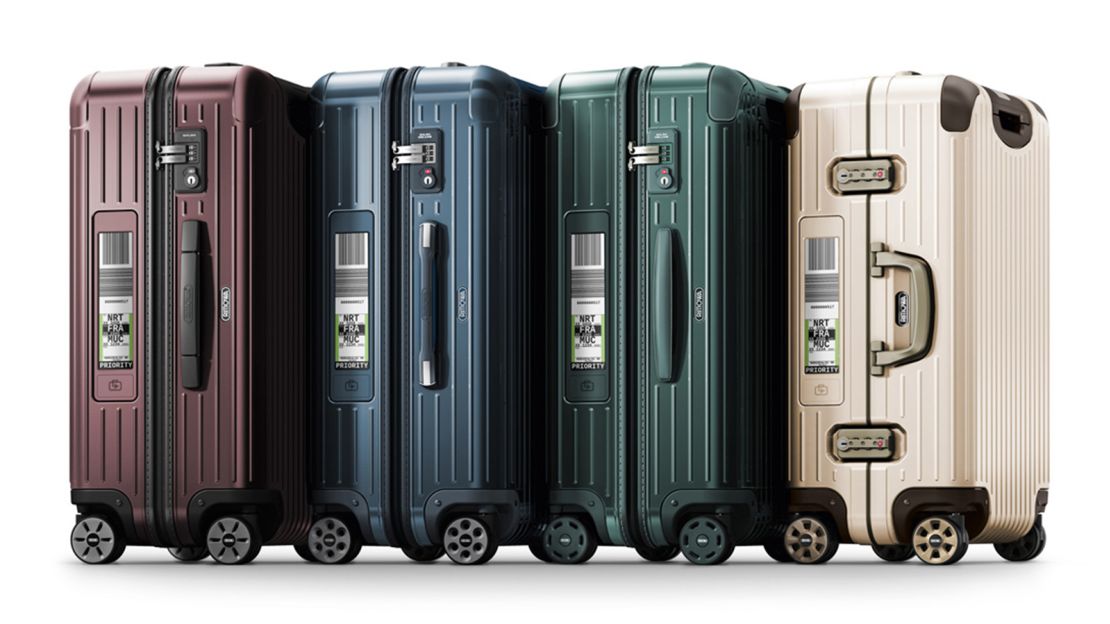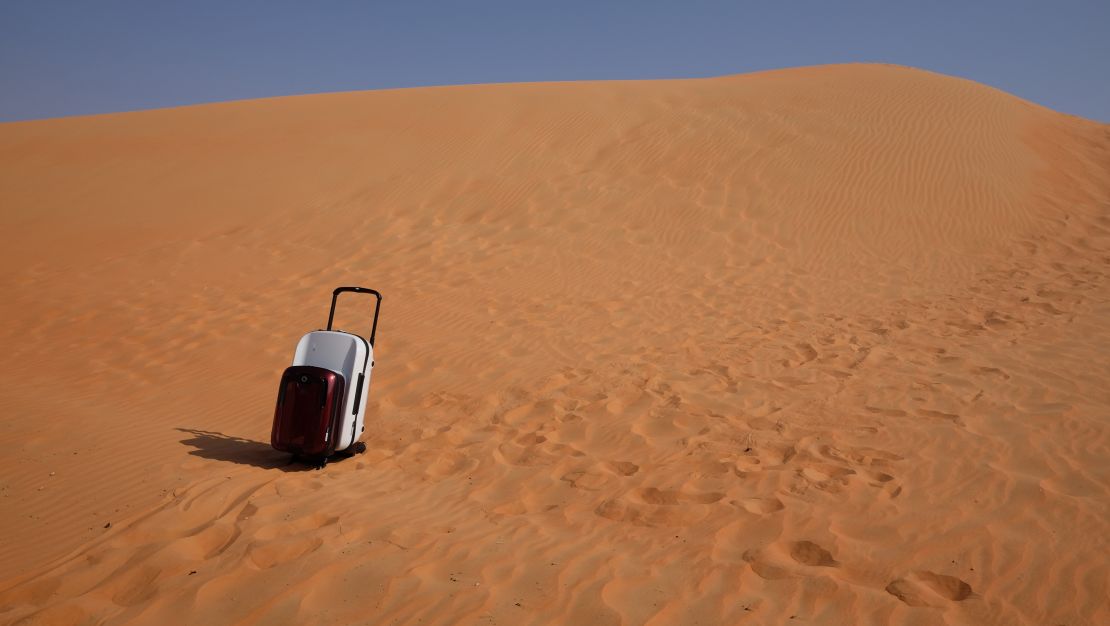In some weird distant future, suitcase archeologists will surely marvel over the cumbersome bags we once used to haul inappropriate clothing from one destination to the other.
“How did we go from ancient steamer trunks to the laser-guided hovercases we use today?” they’ll ask themselves.
Then eureka! In the ruins of what was an ancient burial ground, or possibly Chicago O’Hare airport, they’ll find the fossilized remains of the luggage world’s missing evolutionary link.
And, just maybe, it’ll look like the Bugaboo Boxer.
It’s no stretch to say that manufacturers have come out with bold innovations in recent years that would be welcome on any traveler’s Christmas list:
– There’s the suitcase you can ride around the airport.
– And the one that follows you around like a robot puppy.
The Boxer is part of this new wave of innovation.
It’s the creation of Dutch manufacturer Bugaboo, which made a splash back in 1999 with a stylish range of modular baby strollers that changed the world of posh parenting forever.
Losing the drag

Almost 20 years later, Bugaboo wants to make the same impact with a new luggage range that draws on its baby buggy heritage to do something simple yet revolutionary to the wheeled suitcase.
The big concept? Push instead of pull.
The Boxer allows combinations of cases to be clicked onto a four-wheel trolley that tilts the luggage weight back over the wheels, allowing it to be propelled effortlessly with one hand. When it’s time to stow away, a foot lever pops away the leading wheels. The back wheels fold discreetly away when the handle is collapsed.
A price tag nudging $1,500 for its “fully loaded” edition – including a hardshell check-in, a carry-on and a laptop-protecting organizer – clearly aims it at upscale travelers.
But on a CNN road test comprising a week-long business trip from London to Abu Dhabi, the Boxer proved it has serious mass appeal, despite one or two drawbacks.
First off, Bugaboo’s creation really is a breeze to move around airports and hotels. As with the company’s child strollers, the Boxer can be maneuvered with one hand even when full.
Meet a staircase though, and you’re in trouble. This luggage set clearly isn’t designed for travelers who use metro systems – and with no cute kid on board, no one will stop to help. Adapting to the Boxer’s modular system is tricky at first, but after a few goes becomes simple enough.
‘Power of push’

Earlier adopters of this new concept will get plenty of practice. The Boxer proved such a head-turner on my trip, particularly among admiring folks working in airports and hotels, that I was obliged to give countless product demonstrations.
Max Barenburg, who has spent seven years perfecting the Boxer as Bugaboo’s co-founder and designer, figures it’ll take a while to convince some of its appeal, but they’ll soon get it.
“Once you’ve experienced the power of push, there’s no going back,” he tells CNN via email.
“Wheeling a fully loaded Bugaboo Boxer through a busy airport gives you quite a special feeling. If you have to use traditional wheeled luggage again after that… it makes you wonder why people have put up with such an inconvenient way to travel for so long.”
There’s stiff competition in this field, though.
German luggage manufacturer Rimowa, a long-established player, boasts of expanding sales for its coveted range of premium polycarbonate and aluminum cases.
Though distinctive, Rimowa uses a more conventional upright design that glides on 360-degree corner wheels.
But it’s touting its own innovation: an electronic luggage tag that uses a Bluetooth connection and an embedded E-Ink display to allow travelers to bypass almost all check-in processes.
Smart suitcases
Rimowa isn’t alone on its journey toward creating tech-enabled luggage. US-based Raden produces a range of smart suitcases that can weigh themselves, text you when they get lost and even charge up your smartphone.
Raden’s stylish polycarb corner-wheel uprights occupy a lower price bracket – its A50 check-in and carry-on case combo retails for about $595.
Also in the mix is Away, which launched its own range of “unbreakable” upright wheeled cases, complete with USB charging ports. With a large check-in selling for $295, it’s billed as “first class luggage at a coach price.”
Boasting none of the gadgets of its immediate market rivals, Bugaboo is relying solely on its unique design to attract customers.
Barenburg says his company deliberately set out to produce a different “game-changing” concept that he believes will one day become the “new normal,” imitated by rivals.
“You can see what happened with our strollers… it didn’t take long for other companies to launch competing products that looked a lot like ours.
“But I will say that nobody else has managed to integrate aesthetics and functionality the same way we do.”
The R2-D2 of luggage

It’s true, once you get the hang of it, the Bugaboo Boxer is enjoyably functional. The smooth ballet of its folding wheels is a pleasing thing to behold, as is the straightforwardness of the click-together modular system.
There are a few niggles.
The organizer almost-but-not-quite-comfortably accommodated my 15-inch laptop, making it a struggle to get it in and out.
The carry-on, when attached to the trolley, is quite heavy and, with a capacity of 26 liters, not that roomy (although it does have a zip-out liner that can be used as separate bag).
One of the rear wheels also proved a little temperamental, occasionally popping open as if to offer a friendly wave.
But that, really, is one of the main appeals of the Boxer – it was a very genial traveling companion.
It was also charmingly quirky. Sometimes, on uneven surfaces, it would rebelliously wander off to do its own thing, a little like R2-D2 from “Star Wars.”
Because it reminded me so much of R2-D2, I couldn’t resist dragging it into the sand dunes where the last “Star Wars” movie was filmed for a photo while I was in Abu Dhabi. The Boxer clearly didn’t enjoy this indignity. It waited until we got all the way back to London to repay me by making a small deposit of desert sand on my bedroom carpet.
Which made me like it even more.
This story was originally published in December 2016. Retail prices mentioned in the article can be subject to change.














